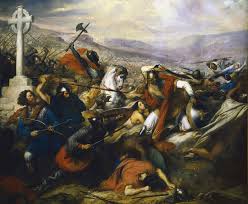
By 732, the Muslim conquest had finally reached the city of Bordeaux killing its governor and putting many people to the sword. Prince Eudes of Aquitaine retreated to Riems and requested the help of Charles Martel. Charles Martel was known as ‘the hammer’ for his ways of killing his enemies on the battlefield. He was a great leader and the unofficial Frankish king. When Charles Martel got the message, he raised a army and set out. The Muslim troops were armed with spear and a sword , the Frankish army were just armed with javelins. On the day of the battle October 25, 732, the Muslims adopt a defensive postition near the river of Vienne, north of Poitiers, awaiting the arrival of the Franks. The Muslims charged and were pushed back by a Frankish counter attack. The Muslim army was forced to pull back farther under a flanking attack by the Aquitainean cavalry to defend its camp, which included women and children of Arab families. The Muslim commander Abd al Rahman was killed as the Franks continued to attack from the rear. The Muslim army, facing massacre, was spared as Charles Martel resisted going in for the kill, abandoning the battlefield and enabling the rest of the Muslim army to retreat from its camp in good order. The Muslims never attacked Aquitaine again. Charles ‘the hammer’ had, as ever, been thoroughly effective. The battle of Poitiers was celebrated as a symbol of Christian resistance for centuries afterwards.
